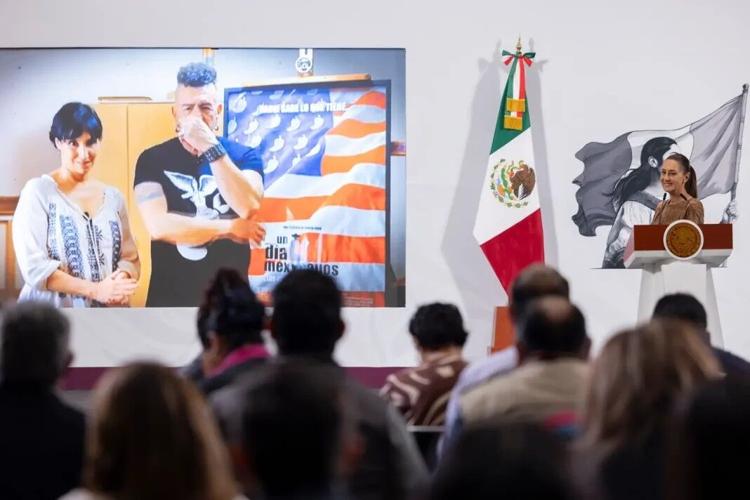
Still of Mexican President Claudia Sheinbaum's morning conference with Yareli Arizmendi and Sergio Arau on screen.
In May 2025, the couple formed by actress Yareli Arizmendi and director Sergio Arau announced "The MeXican Files," a new film project they are currently working on.
Back in 2004, Arizmendi and her husband captured public attention by bringing a controversial topic to the big screen: What would happen in the United States if it went one day without Mexicans which the exploured in their feature length film called “A Day Without a Mexican”. Twenty-one years later, anti-immigrant policies are more present than ever, and for both, this is the perfect time to release a timely film.
To learn more about “The MeXican Files,” an attempt was made to contact Arizmendi. She was expected to attend an event at the Official Residence of Mexico in Los Angeles promoting cinema between both countries. Upon her arrival, it wasn’t hard to recognize her: dressed entirely in black, silver accessories and a white scarf matching her ankle boots. At 61, she retains traces of her youth when she portrayed Rosaura in “Like Water for Chocolate” at age 28, the role that essentially launched her to fame.
After walking the red carpet, Arizmendi agreed to an exclusive interview with CALÓ News. The star of “A Day Without a Mexican” has always sought to go beyond the screen. In addition to being an actress, writer, and director, she has also been active in advocacy through dialogues with such figures as Noam Chomsky, Rigoberta Menchú and John Perkins. Her multifaceted career is complemented by a multicultural life. Born in Mexico City to a Cuban mother and Mexican father, she earned a degree in Political Science and an MFA in Theater from the University of California, San Diego.
CALÓ News – There’s only limited information about "The MeXican Files," but concretely, what is the project about? Is it a sequel to “A Day Without a Mexican”?
Arizmendi – Last year marked 20 years since the film was released. We never imagined that 21 years later, the topic would be even more relevant. Of course, we tried to make “A Day Without a Mexican 2” as a fictional movie, but for many reasons—including the pandemic—the project was halted. Suddenly, everything happening now began unfolding, and someone reached out to us asking what could be done in these times—something that could come out later this year. And while we know we can't make a big Hollywood movie, we do need to show up and speak on what we’re living through. So, we came up with the idea of making a documentary—almost guerrilla-style.
What is the goal of this emergent documentary?

The goal is to speak specifically about the Mexico–United States relationship and between Mexicans and Americans. I emphasize that because so many of the lies people believe stem from ignorance about the history between both countries. Geographically speaking, we’ve been married for a long time. I’m going to tell it how it was, with humor and our signature tone. It’s not about blame—it’s about reconnecting like a family that hasn’t spoken in 20 years, airing the truth and deciding how to move forward.
Did “A Day Without a Mexican” sufficiently cover the anti-immigration issue, or did it fall short?
The goal of the first movie was to open up space to talk about everything. And by using humor, it shifted the tone, because whenever migration was discussed, it was always in the context of horror stories, injustice, victimization and cruelty—all with good reason. So, we asked ourselves: how can we flip the narrative? We wanted to reach an audience that usually avoided the subject. It’s a comedy, with slaps throughout the film.
When talking about maintaining dialogue between both countries, how do you address political and economic interests that are beyond the reach of everyday citizens?
If you speak the truth and focus on basic issues like economics—where the U.S. government has to answer to its citizens—the reality is that Mexico didn’t steal American jobs. The truth is, even before NAFTA, the U.S. had already flooded Mexico and Latin America with its products, driving down wages and crushing any effort to unionize. That’s why I tell people what their fellow Americans did, and then it becomes clear: the U.S. imposed jobs on Mexico and, in doing so, eliminated jobs in the U.S. Because business is business.
In this project, do you also examine the Mexican side—why migration continues, the low wages and the insecurity in the country?
Do you feel like a lot of people are still coming [to the U.S.]? I feel like in the last three weeks, there are more people self-deporting because they’re living in undignified conditions. After 30 or 40 years in the U.S., many still haven’t been able to fix their immigration status. That’s because the U.S. benefits from keeping them undocumented—because you’re not as easily exploitable if you have rights. That’s what has to change.
In Mexico, what happened is that (the government) shifted its focus and started serving the majority—poor people—who historically had been ignored. As a result, the minority—the rich—now feel neglected. The middle class, well, they have global options. I’ve been in the U.S. since the 1980s and I see that in L.A., there’s no work left due to a combination of factors—in my case, the actors’ and writers’ strikes and the tax incentives that drove everyone out of Hollywood. As a result of that arrogance, more filming is now happening in Mexico than here.
Back to "A Day Without a Mexican," did you reach the intended audience or were there distribution problems?
The situation was actually fortunate. Videocine ended up producing it. They usually distribute content all over—to Hollywood, Mexico and Latin America. They were confident that major studios like Fox, Warner, and Universal would fight over the movie, but that didn’t happen. These companies didn’t even know what audience the film was for. So Videocine decided to distribute it themselves—but they didn’t really know the U.S. audience. They asked us, and we ended up running the marketing campaign ourselves. That was the best thing that could’ve happened, because as artists, we knew who we were making it for.
For us, it wasn’t just about promoting a movie—it was about sparking dialogue and creating a buzz. We had the idea to put up a billboard in the middle of Hollywood that read: “On May 14, there will be no Mexicans in California”, along with a website address. This was 2004—there was no social media yet—and suddenly radio and TV stations started getting calls. People didn’t know what it was. Was it a threat from Proposition 187 or the KKK? Others said, “Why only one day? They should leave the U.S. forever.”
At the time, we had strong support from Univision. We called them and a helicopter from the network showed up—seconds later, CNN’s helicopter arrived, and the next day we were on the front page of The Wall Street Journal. What was missing was that it wasn’t distributed to all theaters across the U.S.
And back to "The MeXican Files" … will it be released in theaters or on streaming?
The original plan was to sell it to a streaming platform, but if they buy it in advance, they also acquire the intellectual property and decide when to release it. That’s why we want to sell it to theaters and [follow up with] streaming after the final product is ready, and we expect that to happen this year.













(0) comments
Welcome to the discussion.
Log In
Keep it Clean. Please avoid obscene, vulgar, lewd, racist or sexually-oriented language.
PLEASE TURN OFF YOUR CAPS LOCK.
Don't Threaten. Threats of harming another person will not be tolerated.
Be Truthful. Don't knowingly lie about anyone or anything.
Be Nice. No racism, sexism or any sort of -ism that is degrading to another person.
Be Proactive. Use the 'Report' link on each comment to let us know of abusive posts.
Share with Us. We'd love to hear eyewitness accounts, the history behind an article.